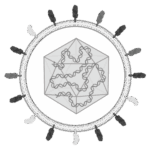- Systems biology
- Human cytomegalovirus
- Pervasive transcription
- RNA-binding proteins
- Degron technology

Human cytomegalovirus (HCMV) is a widespread herpesvirus that establishes lifelong infections in most people. While usually harmless, it can cause severe disease in newborns, transplant recipients, and other immunocompromised patients. Understanding how HCMV controls its genes is therefore critical for both basic biology and future therapies.
For a long time, researchers assumed that HCMV expresses about 700–1,000 different transcripts and a similar number of proteins. However, advanced sequencing methods such as precision nuclear run-on sequencing (PRO-seq) revealed a much more complex picture. In fact, transcription starts at more than 7,000 positions across the viral genome. Our project investigates this hidden layer of pervasive viral transcription in HCMV infection. By combining comprehensive transcription start site (TSS) mapping with integrative computational analysis and innovative cell models, we aim to uncover how the virus regulates gene expression during infection and latency. Specifically, the project will:
- Systematically map viral promoter and enhancer RNAs during lytic infection.
- Analyze how key viral regulators, such as IE2 and UL69, control early gene expression.
- Develop improved models of HCMV latency by introducing conditional control of viral genes using degron-based protein degradation.
- Provide data and insights to the DEEP-DV Transcription Atlas, an international resource for viral gene regulation in herpesvirus infections.
By addressing these goals, we expect to generate a comprehensive understanding of how HCMV balances productive and non-productive transcription. This knowledge will deepen our insight into viral infection strategies, persistence, and reactivation, and may ultimately open up new avenues for antiviral interventions.



